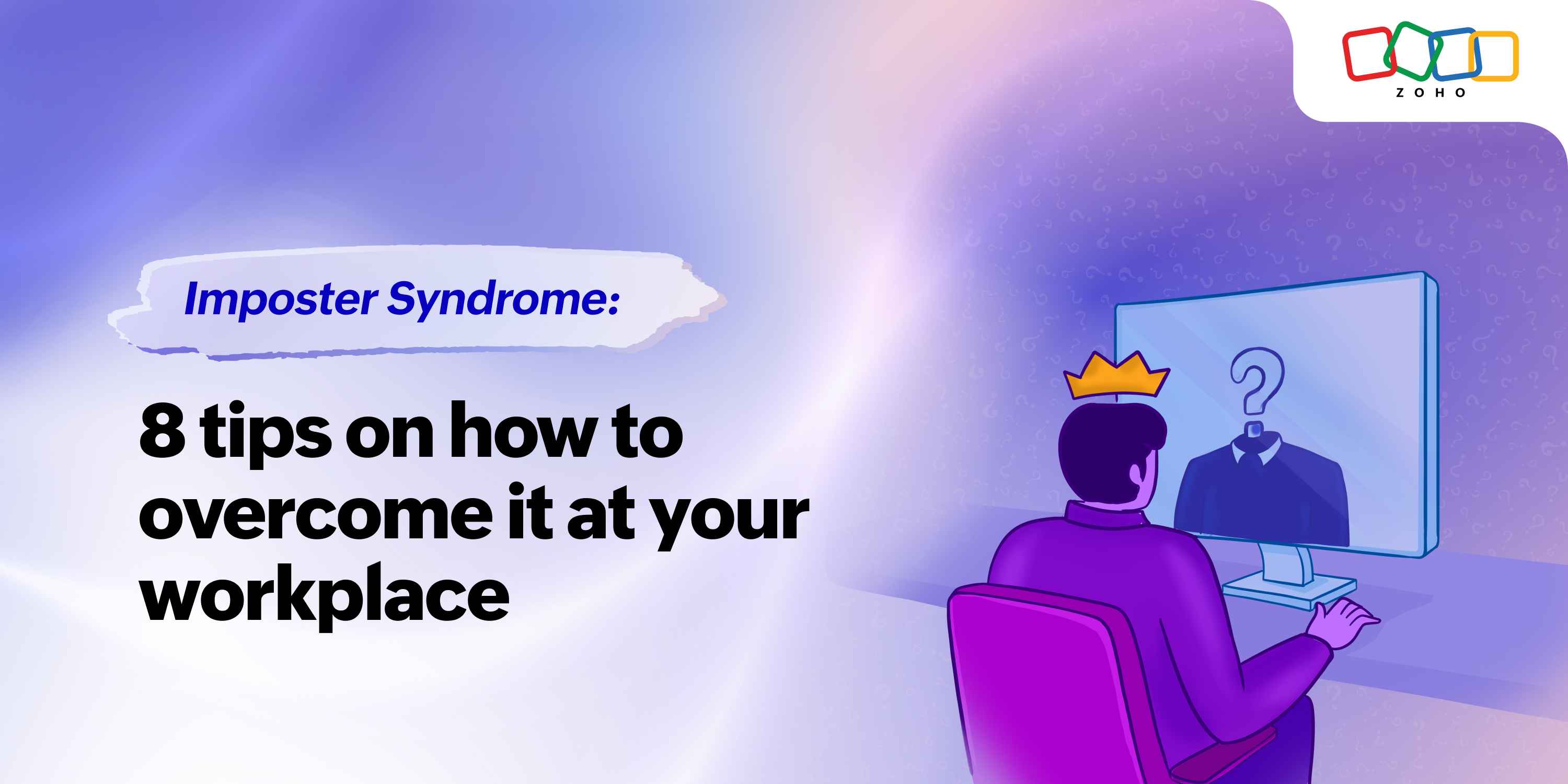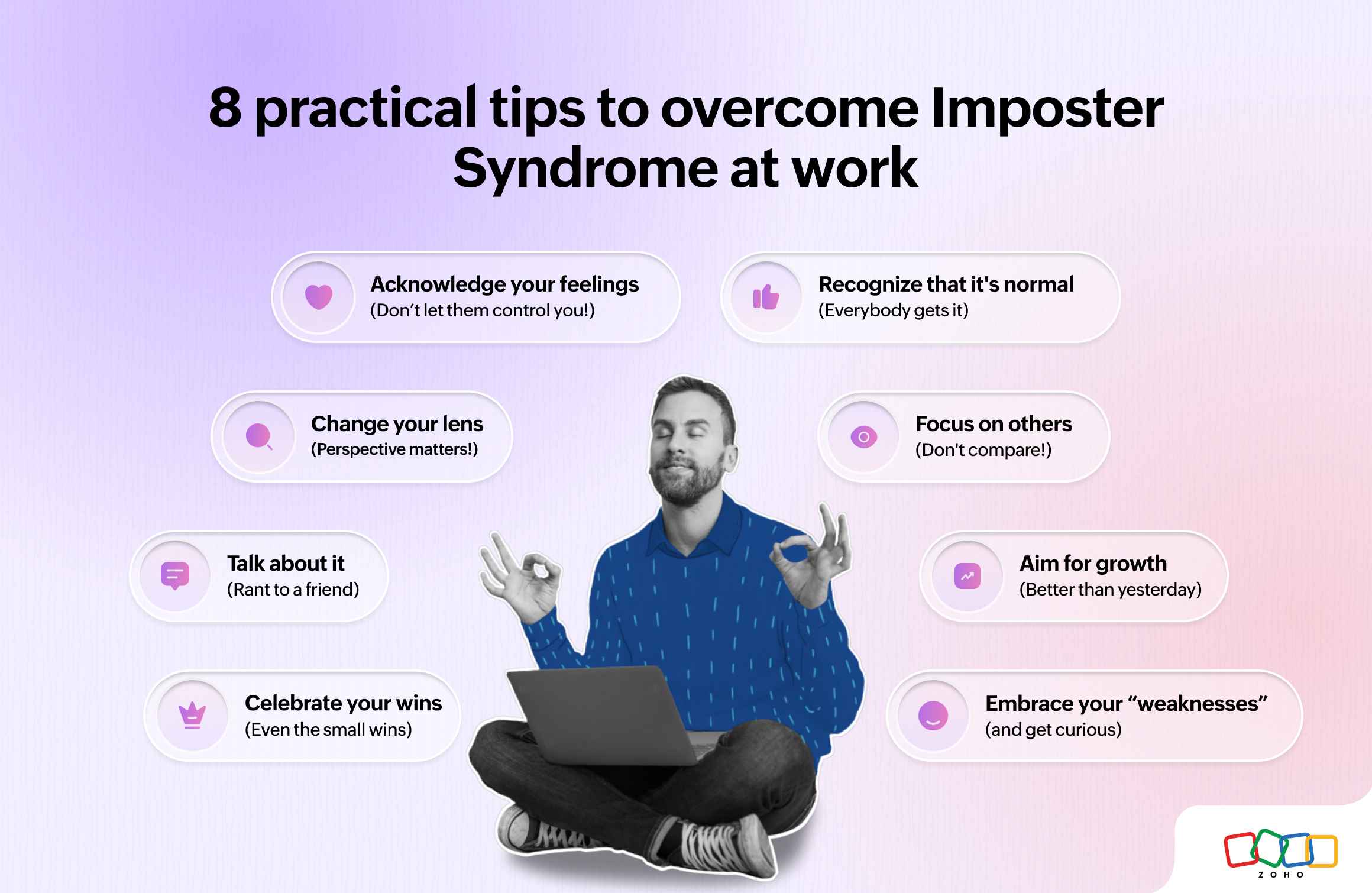- HOME
- All Topics
- Productivity in the workplace
- Imposter syndrome: 8 tips on how to overcome it at your workplace
Imposter syndrome: 8 tips on how to overcome it at your workplace
- Published : March 28, 2025
- Last Updated : March 28, 2025
- 343 Views
- 5 Min Read
You’ve landed a great job, people respect your work, and you’ve achieved milestones you once dreamed of. Yet, there’s that nagging voice in your head whispering, "What if they find out I’m not actually that good?" If this sounds familiar, you’re not alone.
Even after writing 11 books and winning multiple prestigious awards, Maya Angelou admitted she sometimes felt like a fraud. Albert Einstein, despite revolutionizing physics, once described himself as an “involuntary swindler.”
Few of us may achieve what Angelou or Einstein have achieved, but the feeling of fraudulence is remarkably common. If such accomplished figures struggled with self-doubt, it’s no surprise that so many of us do too. This is what is called "imposter syndrome."

What is imposter syndrome?
Imposter syndrome is the constant belief that you’re not as good as other people perceive you to be, despite clear evidence of your achievements. It makes you feel like a fraud and that you’ve only succeeded due to luck rather than skill. This feeling thrives in workplaces where high expectations and comparison are common.
Psychologists Pauline Clance and Suzanne Imes first used the term "Impostor Phenomenon" in 1978. They identified it as a phenomenon that particularly affected high-achieving women. However, research now shows that imposter syndrome can affect anyone, regardless of gender, age, or experience level. It’s especially prevalent in competitive environments where people constantly compare themselves to colleagues.
What may cause imposter syndrome?
Imposter syndrome often stems from deeper psychological and societal factors:
Perfectionism – Holding yourself to impossible standards makes any mistake feel like proof of incompetence.
Early experiences – Growing up in an environment where success was heavily valued or emphasized, or where you were constantly compared to others, can fuel feelings of inadequacy.
Work culture – In competitive workplaces where achievements are downplayed, imposter syndrome thrives.
All of these start rolling into one and finally create an avalanche of self-doubt as we journey through our careers. But first, how do you know you're experiencing it?
Signs you're experiencing imposter syndrome at work
- You downplay your achievements – You dismiss compliments, thinking anyone could have done that.
- You chalk up your success to luck – You believe it wasn’t your skills or hard work but just good timing or external factors that got you where you are.
- You fear being “exposed” – You constantly worry that others will realize you’re not as capable as they think.
- You fear failure and success – You're terrified of failure, but success terrifies you too because it might raise expectations.
- You compare yourself to others – You focus on their successes while dwelling on your own mistakes and doubts.
- You overwork to compensate – You push yourself to extremes to prove your worth, often leading to burnout.
- You hesitate to ask for help – You fear that seeking assistance will expose your perceived inadequacy.
- You set impossibly high standards – Anything less than perfection feels like failure.
If this sounds familiar, don’t worry. Simply recognizing imposter syndrome is the first step to taming it.
How to overcome imposter syndrome at your workplace
Here are some actionable steps to help you silence that voice of self-doubt and embrace your worth:
1. Acknowledge your feelings—but don’t let them control you
You might feel like an impostor at times— that’s alright. The key is to remind yourself that feelings aren’t facts. Try this: Jot down your feelings of self-doubt, and then list the evidence that contradicts them. For example, if you think, “I don’t deserve this promotion,” write down the skills, experience, and achievements that earned it.
2. Change your lens
If you find yourself thinking “I don’t deserve this," challenge that thought. Ask yourself, "What evidence do I have that supports this belief?" and "What evidence contradicts it?" Chances are, the evidence of your skills and accomplishments far outweighs your self-doubt.
For example, instead of thinking, “I only got this job because I was lucky,” reframe it to, “I got this job because I worked hard and demonstrated my abilities.”
3. Talk about it
Do you know how many people feel the way you do? You might be in for a surprise. Sharing your feelings with a trusted colleague, mentor, or friend can help you realize you’re not alone.
Talking about it also helps normalize the experience. When you hear others admit their own doubts, it becomes easier to see that imposter syndrome is a shared human experience, not a personal flaw.
4. Celebrate your wins
Keep a journal where you document your achievements, positive feedback, and milestones. When self-doubt creeps in, come back to this list.
The next time you receive praise from a client or complete a challenging project, write it down. Or do your little "celebration dance" like no one's watching. Over time, this collection of wins will serve as a powerful reminder of your capabilities.
5. Focus on others (but don't compare)
This may seem counter-intuitive, but the keyword here is "focus." Focus but don't compare. Remember, everyone has moments of doubt, not just us. We see our blooper reel and others' highlight reels. But looking closely at what others are doing can reveal more depths. It reveals the bigger picture: You're not alone.
6. Aim for growth
Instead of striving for perfection, aim for growth. Mistakes and challenges are part of the learning process, not proof that you’re a fraud.
Ask, "What can I take from this?" We often obsess over past stumbles, thinking they define us now—but what you do today at work sets up what’s coming. Push past the doubt, and you’re already better than yesterday!
7. Embrace your “weaknesses” and get curious
A lot of doubt stems from uncertainty. If you’re new to a management role, you may feel insecure about your ability to lead.
Even if you don’t have years of experience as a manager, chances are you’ve led before. Look for examples in your own life of the skills you wish you had. You’ll likely find real-life experience to back you up.
8. Recognize that it's normal
Think about it—before your promotion, you were skilled enough that someone saw leadership potential in you. But most people don’t walk into their first supervisor position already knowing how to lead. Even if you were one of the lucky ones who got formal training, you certainly won’t be an expert right away. This is perfectly normal.

Final word
There’s a famous story about a gathering of extraordinary people—scientists, artists, and leaders. One attendee, feeling completely out of place, struck up a conversation with an elderly gentleman who admitted: "I just look at all these people and think, what am I doing here? They’ve made amazing things. I just went where I was sent."
That elderly gentleman was Neil Armstrong, the first person to walk on the moon. If even Neil Armstrong felt like an imposter, maybe we’re all just doing our best, slightly out of our depth, but figuring it out as we go. And that’s okay.
Imposter syndrome isn’t a reflection of your abilities. The next time self-doubt knocks, remind yourself: You’ve earned your place. Keep going.
 Srinath Vijayakumar
Srinath VijayakumarSrinath is a product marketer for Zoho Workplace. He talks about productivity, tips to improve communication, and nuggets on doing your best at your workplace. He has great interest in bringing a fresh perspective to the forefront. He is highly optimistic to the extent that he opens the refrigerator every 10 minutes, hoping to find something new. Outside of work, you will catch him playing football, travelling or writing half-finished stories.












Comments(2)
Hello Srinath, I read your article regarding 8 tips on overcoming imposter syndrome in my research for a class presentation. Thank you for creating such an insightful reading. Can I use the graphic and share the link to your article on my linkedin post? I look forward to hearing from you. Monica De Lozadapadin www.linkedin.com/in/de-lozadapadin
Hello Monica, we're delighted to hear you found the article helpful! Feel free to share the link and use the graphic, but please ensure it remains unchanged, with our logo visible and Zoho credited (in your post). Best of luck with your presentation!